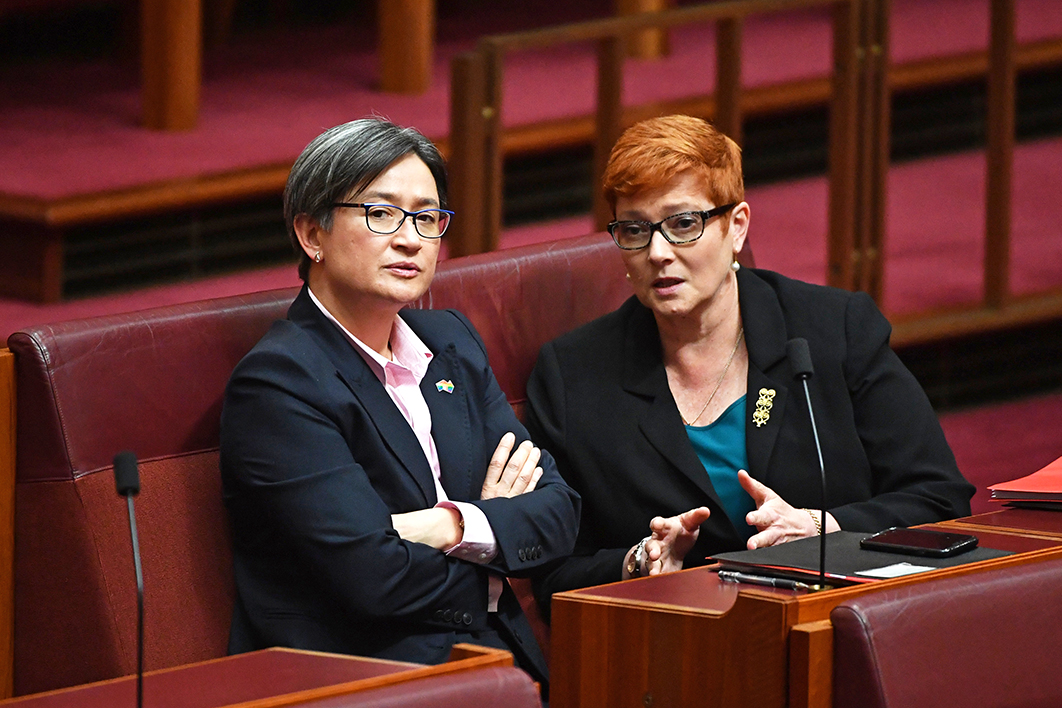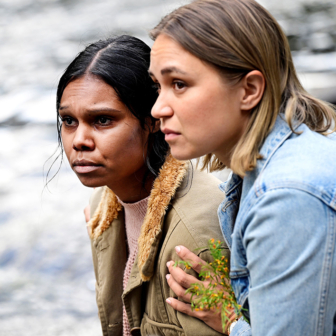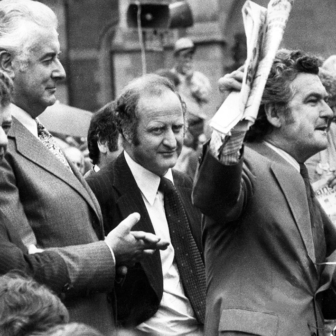Laura Tingle was trending on Twitter again not long after Monday’s 7.30. Aside from remarking on her adventurous taste in earrings, most of the commentary focused on her interview with former Liberal MP Julia Banks.
It was, in fact, less an interview than an extended opportunity for Banks to detail the “shocking allegations” she makes against parliamentary colleagues in her new memoir, Power Play. Banks looked nervous as she began to describe a working environment where “Mad Men meets House of Cards.” Tingle prompted rather than challenged.
Allegations like these certainly matter, but in the absence of consequences their continued outpouring risks simply becoming dispiriting. Last week’s Four Corners featured another extended airing of grievances by former Australia Post chief executive Christine Holgate. “I was thrown under the bus and the bus reversed back over me,” Holgate said as she recalled the prime minister’s sudden attack on her in parliament last October.
When such powerful and influential women present themselves as victims, the message is double-edged. On the one hand — and this is Banks’s and Holgate’s point — it shows they are up against an exceptionally hard-grained, intractable culture of abuse wrought by those more powerful than themselves.
On the other hand, it raises questions about how women in positions of power can manage their options. This is the focus of Ms Represented, a four-part ABC series premiering next Tuesday to mark the centenary of the first time Edith Cowan — the first woman elected to an Australian parliament — spoke in Western Australia’s House of Assembly.
Writer and presenter Annabel Crabb, who sometimes risks trivialisation in her determination to show the lighter side of our political culture, is at her best here: crisp, vivid and ironic. She and director Stamatia Maroupas, with deft work from editors Andrew Hope and Karin Steininger, blend historical narrative with observations by twenty groundbreaking female parliamentarians.
One of their strategies is to get the participants to read the historical narrative to camera, cross-edited between speakers. And so we have Anne Aly, Ros Kelly, Julie Bishop, Linda Burney, Natasha Stott Despoja, Amanda Vanstone, Julia Gillard, Bronwyn Bishop and Penny Wong working as an ensemble to tell the story of how the 1902 Franchise Act was passed.
Aside from the novelty of catching all these speakers quite literally reading from the same page, there’s significant entertainment value in the way they present the material. Rivalling trained actors, they use shifts in tone and pace to underline the absurdities of antiquated political attitudes. Except, of course, such presumptions are now proving to be not so antiquated.
These female voices from across the political spectrum are also in chorus, unscripted this time, on the syndrome of “gender deafness.” It goes something like this: put forward an idea in a meeting, and there is no response — until, a few minutes later, it is repeated by a male colleague as if it were his own, and is thereafter cited with general approval.
In the telling, these experiences come across as social satire rather than victim narrative; the speakers share a wry awareness of their own capacity to manipulate the wilful blindness of ego-driven male colleagues. But there are times when it really is no longer funny, as a succession of recent scandals and crises has shown.
In some of the worst instances, the procedures of the parliament itself are at issue. Sarah Hanson-Young’s account of being sabotaged on the floor of the Senate by Cory Bernardi, who crept up behind her and audibly whispered the names of all the male colleagues he implied she had been intimately involved with, is well supported by video documentation from the chamber. Bernardi was called to order, but it was Hanson-Young who was formally ruled against, for suggesting that he be breathalysed.
What is most striking about Ms Represented is how, time and again, these usually discordant voices converge to present identical narratives and perspectives on issues that really matter, not so much for themselves as individuals trying to make their way in an especially difficult professional environment, but for women in general.
They emphasise the opportunities they have as parliamentarians, and the responsibility they feel. Quick-witted, insightful and determined, and with a directness and honesty rarely evident when they are “on message,” they make entertaining company across the four episodes. “What’s not to like?” as Amanda Vanstone asks at one point.
And yet, over the decades, there has been so much outright vilification, from shocking comments in the 1902 Hansard about the prospect of Aboriginal women in parliament, read out by Linda Burney, to Tony Abbott and his supporters congregating under a placard urging “Ditch the Witch.”
The centenary perspective is an appropriate reminder that a difficult road has been travelled, but also that any sense that the journey is complete is premature. What the series lacks is the perspective of independent MPs, with Cathy McGowan, Jacqui Lambie, Kerryn Phelps, Helen Haines and Zali Steggall all unaccountably missing. Surely an additional episode might be devoted to them? They may well hold the key to a real change in the culture of parliament. •




